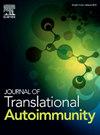The antibody repertoire of autoimmune sensory neuronopathies targets pathways of the innate and adaptive immune system. An autoantigenomic approach
IF 3.6
Q2 IMMUNOLOGY
引用次数: 0
Abstract
Sensory neuronopathies (SNN) encompass diverse etiologies, with autoimmunity playing a major role through both cellular and humoral responses. To investigate the humoral autoantibody repertoire in autoimmune SNN, we conducted a retrospective cohort study using large Human Proteome-wide protein microarrays (HuProt 3.1, HuProt 4.0, ProtoArrays). We specifically analyzed immune system pathways targeted within the autoantigen repertoire (the autoantigenome). We included 131 participants: 44 patients with non-paraneoplastic autoimmune SNN (12 with anti-FGFR3 and/or anti-AGO antibodies), 8 with paraneoplastic SNN, and 79 controls. Findings were validated in an independent cohort of 16 SNN patients. Overrepresentation of immune-system-related proteins was assessed using the Reactome database, and serum levels of IFN-γ and IL-6 were measured with the Bio-Plex Pro™ Reagent Kit. Autoimmune SNN sera interact with significantly more immune system proteins than healthy controls (ProtoArrays: 271/863 vs. 14/863, HuProt: 112/1694 vs. 39/1694, both p < 0.0001). Overrepresentation was observed across all major immune sub-pathways, including innate and adaptive immune responses as well as cytokine signaling. Anti-FGFR3-positive SNN patients showed more frequent reactivity to immune system proteins than anti-FGFR3-negative ones. The independent SNN cohort validated the overrepresentation of targeted immune system pathways. Validation with dot blot and ELISA confirmed reactivity to TRIM21 and IL-6 and identified anti-IFN-γ-positive SNN patients. IFN-γ levels correlated weakly with levels of anti-IFN-γ antibodies (Pearson's r = 0.22, p = 0.03). We conclude that the antibody repertoire of autoimmune SNN targets pathways of the innate and adaptive immune system, potentially reflecting key disease-related immune pathways and highlighting the systemic role of immune dysregulation in SNN.
自身免疫性感觉神经病变的抗体库靶向先天性和适应性免疫系统的途径。自体抗基因组方法
感觉神经病变(SNN)包括多种病因,自身免疫通过细胞和体液反应发挥主要作用。为了研究自身免疫性SNN中的体液自身抗体库,我们使用大型人类蛋白质组蛋白微阵列(HuProt 3.1, HuProt 4.0, ProtoArrays)进行了一项回顾性队列研究。我们专门分析了针对自身抗原库(自身抗基因组)的免疫系统途径。我们纳入了131名参与者:44名非副肿瘤自身免疫性SNN患者(12名具有抗fgfr3和/或抗ago抗体),8名副肿瘤SNN患者和79名对照组。研究结果在16例SNN患者的独立队列中得到验证。使用Reactome数据库评估免疫系统相关蛋白的过度表达,使用Bio-Plex Pro™试剂盒测量血清IFN-γ和IL-6水平。自身免疫SNN血清与免疫系统蛋白的相互作用明显多于健康对照组(ProtoArrays: 277 /863 vs. 14/863, HuProt: 112/1694 vs. 39/1694, p <;0.0001)。在所有主要的免疫亚通路中,包括先天和适应性免疫反应以及细胞因子信号传导,都观察到代表性过高。抗fgfr3阳性SNN患者对免疫系统蛋白的反应比抗fgfr3阴性SNN患者更频繁。独立SNN队列验证了靶向免疫系统途径的过度代表性。dot blot和ELISA验证了对TRIM21和IL-6的反应性,并鉴定出抗ifn -γ阳性SNN患者。IFN-γ水平与抗IFN-γ抗体水平呈弱相关(Pearson’s r = 0.22, p = 0.03)。我们得出结论,自身免疫性SNN的抗体库靶向先天性和适应性免疫系统的途径,可能反映了关键的疾病相关免疫途径,并突出了免疫失调在SNN中的全身性作用。
本文章由计算机程序翻译,如有差异,请以英文原文为准。
求助全文
约1分钟内获得全文
求助全文
来源期刊

Journal of Translational Autoimmunity
Medicine-Immunology and Allergy
CiteScore
7.80
自引率
2.60%
发文量
33
审稿时长
55 days
 求助内容:
求助内容: 应助结果提醒方式:
应助结果提醒方式:


